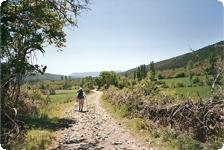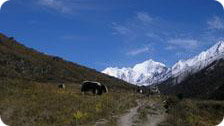by Lisa McCallum
Some people plan their whole lives—or at least a few hours—for a trek on the famed El Camino de Santiago de Compostela, the trail that flows from southern France to the northwestern edge of Spain. This holy trail is the goal for devout Christians who want to follow in the footsteps of Saint James as he trudged through the Pyrenees Mountains to Santiago de Compostela. I wasn’t devout. I wasn’t on the quest for enlightenment. I was merely a solo traveler in a village along the trail called Jaca, in northern Spain, on the advice of an English friend who had once spent a romantic weekend there with her Spanish boyfriend.
As we had chatted in Barcelona, I begged my friend for suggestions. I had a few days to kill before my flight to Italy and I didn’t want to spend them in Barcelona; I had seen everything there. I wanted nature. I wanted hiking. “You really must go to Jaca!” she insisted. The next day, I was on a bus there, oblivious to the El Camino.
I found a room to rent in a family’s home. As fascinating as it was for me to see how middle-class Spaniards live and to sleep in their extra bedroom, I was anxious to stretch my legs in the Catalonian countryside. I wandered towards the center of town and passed the Jaca fortress with its family of deer looking out at me peacefully from a moat’s dark shade, their black eyes twinkling.
At the tourist information office, I asked in my minimal Spanish, “Are there hiking trails around here?”
Unfazed by my ignorance, the man brought out a map of the area with trails highlighted. First he mentioned the El Camino, of course. It looked very long, and it was—all the way from France. I asked if people could just walk a bit of the trail and not the whole thing.
“Yes! You can take a bus up to this village, Villanúa, and then hike back to Jaca. Only fourteen kilometers, a nice day hike. Many people do this. It is beautiful!” He told me the trail was marked with signs to make it easier. I was sold. I went home and looked up the trail in my guidebook. Yup—it was long. It was actually a pilgrimage. I wasn’t a pilgrim, but the tourist info guy seemed to think mere laypeople could walk the trail without spiritual repercussions.
The next morning, I had a pastry and thick, sweet coffee at a café/bar before hopping on a bus to Villanúa, a village north of Jaca comprised of Swiss-looking chalet houses with the Pyrenees as their backdrop. The mountains wore snow on their tips that contrasted with the deep green forests around their middles. I stared at the view for a minute before realizing I had better get started. I had fourteen kilometers to walk and I wasn’t used to being out in the countryside by myself. I took in the spectacular image of the mountains one last time, turned away from the village to face south, and started walking. There were no trail markers in sight, but I figured I would stumble on one eventually.
After walking along the highway for a few minutes, I noticed an older woman walking a half a mile ahead of me. Probably in her late sixties, she carried a thick walking stick for balance. Despite this, she looked very fit, and the size of her backpack showed she was walking the El Camino for real. She was clearly trekking all the way from France to the edge of Spain. I wondered if she knew where she was going and, if she did, if I could keep up with her. My secret plan: follow her so I wouldn’t get lost in the wilderness where no one would ever find me again.
We walked together, me behind her, for a mile or so until my plan fell apart. The woman stopped to check the trail in her guidebook and I had to slow down so as to not overtake her. I had wanted to hike on my own, but now that I saw how infrequent the markers were and that they were often nonexistent when the trail split off, I wanted to follow her. As much as I wanted solitude and didn’t want to disturb her, I approached her. If nothing else, it’s always safer to hike with a partner rather than alone. I wanted to know if she spoke Spanish. If nothing else, she probably knew some English and we could decipher the trail together.
“Hola!” I said. She smiled and nodded, but remained silent. I tried again. “Hello!”
“Bonjour!” she answered.
“French?”
“Oui.”
I pointed at myself. “American.”
We smiled and shook hands. We tried to find a common language, but we came up with nothing. Together, we had the European languages down: she spoke French and a little Italian, I spoke English, German, and a little Spanish. This was a unique problem for me. Most of the people I came into contact with on my travels abroad spoke at least a little English—and they enjoyed trying it out.
We attempted to make small talk. I asked her questions in Spanish because some words were similar to French. She tried to answer, then asked me questions in French. After a few minutes of walking and struggling to understand each other, we gave up.
Without discussing it, we had unanimously decided to hike silently together, she in front with her stick and me behind. It was an odd feeling to spend time with someone and to not be able to talk with them. I had hiked in small groups in which we were each from different countries, but we could always communicate a little. After a while, though, I got used to our genial silence. Our smiles said everything. We enjoyed each other’s company, even though we didn’t know anything about one another. Sometimes we switched and I would walk in front. When we weren’t sure which trail to take, we looked for the yellow markers. My French companion usually found them after a few seconds of searching or checking her guidebook. I grew more and more grateful for her expert hiking skills, especially at the forks without markers.
We hiked a few kilometers in the warm sun, stopped at a small creek, and rested on boulders by the gurgling water. She gave me some figs when she saw I had no fruit. Then we hiked the rest of the way to Jaca together through wilderness that I would have been a little frightened to walk through on my own. With my new friend, it was one of the most restful hikes I have ever taken, simply because we didn’t feel pressure to make small talk when we knew we couldn’t. It was almost like being alone, but more reassuring because I knew I wouldn’t get lost.
We reached Jaca after a few hours and crossed over from the trail onto a street at the edge of town. My French friend turned to me and asked, “Auberge?” Hostel. I knew it in Spanish as albergue. She really was a pilgrim. The albergues only allowed actual El Camino pilgrims to stay in them. The day before, I had seen the sign for the local albergue near the center of town. I wasn’t going that way, but I remembered how resourceful she was. I pointed towards the center of town. “Go straight, then left. It’s not far,” I told her in Spanish. She nodded like she understood. After all, she was walking the whole El Camino trail and had done so three times before in her life—that much I had understood during our first exchange. I was confident she would find the albergue without me.
We smiled, shook hands, and said “Merci” and “Bon voyage!” I wanted to say thank you for guiding me back to Jaca, but I couldn’t. I think she told me in French that she enjoyed my company. I wished her, “Buena suerte!” and she wished me, “Bonne chance!” With her walking stick, she took off down the street, ready to travel on her own once again. I turned away from her, grateful that our paths had merged for a few peaceful hours in the Pyrenees, and headed towards my hostal, wondering just how lost I would have been without her.
About the Author
Lisa McCallum is a writer, traveler, and teacher of English as a Second Language to
adult immigrants and refugees in the Twin Cities.









